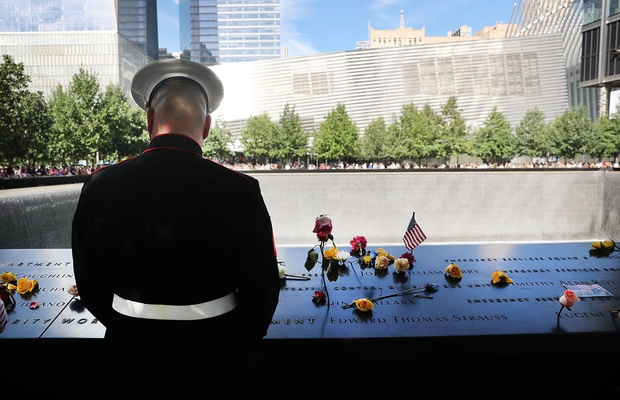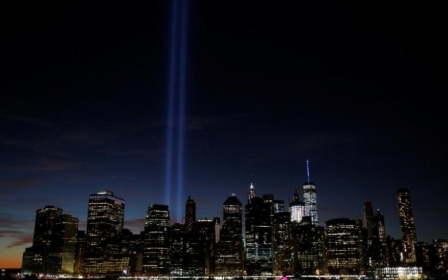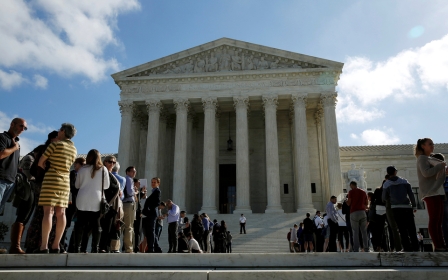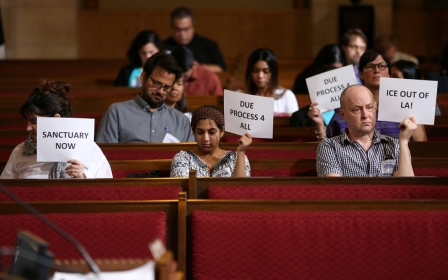Trump's poison pill: Saudi Arabia versus 9/11 families

NEW YORK, United States – President Donald Trump speaks of his preference for simplicity and bemoans the “complicated” issues that reach his desk. No surprise, then, that he is dodging an awkward tussle between the families of 9/11 victims and a key Middle Eastern ally.
It is a tightrope he will have to walk. Thanks to legislation passed last year, some of those bereaved by the 9/11 attacks are suing Saudi Arabia’s government for its alleged role in the hijackings in civil suits that are expected to gain momentum early this summer.
In response, the Saudis are bankrolling a phalanx of lobbyists and US military veterans to persuade Congress to dilute the so-called Justice Against Sponsors of Terrorism Act (JASTA), which passed in September despite objections from then-president Barack Obama, a Democrat.
Back then, Trump, a Republican, bashed Obama for betraying the victims of 9/11. But as leader of the free world, this case requires a delicate balance between his citizens’ calls for justice, keeping cosy with oil-rich Saudis and upholding the international norm of sovereign immunity.
By no means is this Trump’s top issue. He must address North Korea’s nuclear programme and global trade imbalances while rushing to deliver domestic breakthroughs on healthcare or tax reform before popping the champagne on his 100th day in office on 29 April.
It is perhaps no surprise, then, that the White House did not answer Middle East Eye’s request for comment on the multibillion-dollar Saudi lawsuits. But for Terry Strada, whose husband died in the World Trade Center on 9/11, it is a no-brainer.
“The White House needs to stand by its commitment to the American people and victims of terrorism by continuing to support JASTA and not support any amendment to the law, and certainly not any amendment that may come as a result of the multi-million dollar Saudi-funded campaign against JASTA,” Strada told MEE.
Saudi sends in lobbyists
Trump cannot nix or amend JASTA on his own – that requires Congress. Lawmakers overwhelmingly supported the act in September during an election campaign in a nation that still mourns the nearly 3,000 people who perished in New York, Washington and Pennsylvania.
Relatives of those victims and their insurers are suing the Saudi government as well as Saudi banks, charities and aviation firms in a series of cases in New York, Washington and elsewhere that are gradually being consolidated into larger suits.
Plaintiffs point to the fact that 15 of the 19 hijackers were Saudi citizens, as was al-Qaeda kingpin Osama bin Laden. Saudi officials and institutions “aided and abetted” the global terror network in the years leading up to the 9/11 attacks, case documents allege.
The Saudi government rejects this. A US government investigation in 2002 found that official links with the terrorists could not be independently verified, but 28 pages of that report were not made public until 2016 and many critics still point to a cover-up.
Saudi paid Qorvis MSLGroup and other Washington-based outfits to derail JASTA and now lobby for amendments to the act – perhaps by capping lawyer fees to 5 percent of settlement sums to discourage attorneys from taking cases.
Qorvis and other firms have helped scores of US veterans take all-expenses-paid trips to Washington, including stays in the $800-per-night Trump International Hotel, for sit-downs with lawmakers about re-writing JASTA.
Brad Owens, a marine veteran who now works as an intelligence contractor in Africa and elsewhere, says JASTA exposes American diplomats, servicemen and others deployed overseas to copycat foreign legislation.
It creates a rare loophole to the sovereign immunity enjoyed by governments in courts. By allowing cases to be brought against the Saudi government, other countries may enact laws that open up US servicemen to similar suits, said Owens.
“The Saudis have always been our allies in the region. They support joint actions that we do. They’ve monetarily supported military actions we’ve taken against our enemies by matching their dollars all the way back during the Cold War with the Mujahedeen,” Owens told MEE.
He is not alone. The European Union warns of the “inherent danger of causing reciprocal action by other states”. Kim Beazley, Australia’s former defence minister, branded JASTA a “disaster” and a “poison pill” for Trump.
'Shady as hell'
Not every veteran who visited Washington agrees. Tim Cord, a US veteran who served in Iraq, says he was one of several servicemen who joined a fancy lobbying junket without being told the money came from Riyadh.
Once in Washington, he says he realised that Saudi Arabia was “hiring vets to go lobby on JASTA so as not to get sued by the 9/11 victims and their families for being directly responsible for 9/11 and state-sponsored terrorism”.
“The whole thing was just shady as hell. I felt sick. I felt dirty. I felt used,” Cord told MEE.
Strada, chairperson of 9/11 Families & Survivors United for Justice Against Terrorism, accuses Riyadh of duping veterans in a corrupt “spending spree” and has urged the Justice Department to investigate whether US lobbying rules were broken.
The department and lobbying outfit Qorvis declined to comment. It is unclear whether lawmakers will revisit JASTA anytime soon, though the issue will likely return to the spotlight once the civil cases make headway in the courts.
According to Brian McGlinchey, who runs the 28pages.org website about alleged Saudi complicity in 9/11, the cases will reach a tipping point this summer should the plaintiffs request the disclosure of classified material from the Saudi and US governments.
“The closer we get to discovery and the meaningful production of new facts about this, the more the Saudi government will have an interest in settling this case and the more the US government will have an interest in Saudi Arabia settling it,” McGlinchey told MEE.
Equally, Riyadh may come good on a promise to sell up $750bn in US treasury securities and other assets before they become in danger of being frozen by American courts – threatening both the US economy and its own.
Trump has not repeated his campaign-trail support for the 9/11 families since taking office in January. From the White House, he has raised the rhetoric on Riyadh’s regional rival, Iran, and is considering boosting US support for Saudi’s war in neighbouring Yemen.
According to Michael Hudson, a Georgetown University scholar, Trump may well adapt to the complications inherent in policy-making and steer towards the calmest channel through choppy waters.
“Do the benefits of ideological consistency - restating a position that has broad congressional and popular support - outweigh the costs of Saudi unhappiness, including the withdrawal of financial carrots?” Hudson asked.
“On the other hand, do the benefits of cosying back up to the Saudis come at the cost of domestic support? My guess is that Trump will invest more political and military capital in the Saudi regime and downplay further endorsement of the JASTA cause.”
New MEE newsletter: Jerusalem Dispatch
Sign up to get the latest insights and analysis on Israel-Palestine, alongside Turkey Unpacked and other MEE newsletters
Middle East Eye delivers independent and unrivalled coverage and analysis of the Middle East, North Africa and beyond. To learn more about republishing this content and the associated fees, please fill out this form. More about MEE can be found here.




